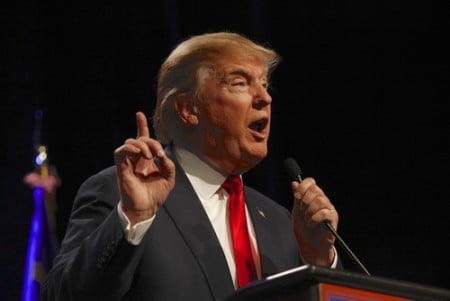Criticized by Trump for blocking his immigration order, this 'so-called judge' is a Bush appointee

President Donald Trump. Joseph Sohm / Shutterstock, Inc.
The Seattle federal judge who blocked President Donald Trump’s executive order on immigration is a Republican appointee who was confirmed to his judgeship in 2004 with no opposition.
The judge, 69-year-old James Robart, issued a nationwide temporary restraining order Friday that blocked Trump’s temporary ban on entry into the United States by refugees and immigrants from seven majority-Muslim nations. A federal appeals court refused Sunday to immediately block Robart’s order. Publications covering Robart’s background include the New York Times, the Associated Press, the Washington Post and the Seattle Times.
Trump reacted to Robart’s decision on Twitter. “The opinion of this so-called judge, which essentially takes law-enforcement away from our country, is ridiculous and will be overturned!” Trump wrote on Saturday. “What is our country coming to when a judge can halt a Homeland Security travel ban and anyone, even with bad intentions, can come into U.S.?” he said in another tweet. “Because the ban was lifted by a judge, many very bad and dangerous people may be pouring into our country. A terrible decision,” Trump said in a third tweet.
Trump continued the criticism on Sunday, Politico reports. “Just cannot believe a judge would put our country in such peril. If something happens blame him and court system. People pouring in. Bad!” Trump tweeted.
ABA President Linda Klein today addressed these comments in a speech before the ABA House of Delegates at the association’s midyear meeting. “There are no ‘so-called judges’ in America,” Klein said. “There are simply judges—fair and impartial. And we must keep it that way.”
Robart was nominated for a federal judgeship by President George W. Bush. He is a Georgetown University law graduate who was a commercial litigator at Lane Powell Spears Lubersky, where he became managing partner, according to the Seattle Times. The AP story identifies Robert as an expert in patent and intellectual property law.
Before becoming a judge, Robart had represented refugees from Southeast Asia and was president of Seattle Children’s Home, which offers services for at-risk youth. He and his wife were foster parents to six children.
On the bench, Robart wrote an opinion, upheld on appeal, giving guidance on how to calculate rates for use of another company’s patents, according to the AP story.
In another case that garnered press attention, Robart oversaw a federal consent decree addressing alleged excessive force by the Seattle Police Department. In a hearing last year, Robart noted statistics that found racial disparities in fatal shootings by police. “Black lives matter,” he said.
AP spoke with former Seattle U.S. attorney John McKay, who worked with Robart at Lane Powell. Robart is “a very careful judge, and he’s conservative in the sense he looks at the law and tries to determine what that is, not what he wants,” McKay said. “He’s conservative in his review of the law, but courageous in his application of it.”
Updated at 12:08 p.m. to note to comments from ABA President Linda Klein.



